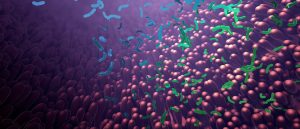nutriNews International had the opportunity to speak with Dr. Andres Gomez Assistant Professor and Microbial Ecologist at the
University of Minnesota. In this interview Dr. Gomez talked to us about some of his past research as well as his current work with the swine microbiome. Sharing his insights regarding the potential applicability of this type of research from a productive standpoint.
NutriNews International: Dr. Gomez on behalf of NutriNews International I want to welcome you to our new series of interviews and podcasts. We are a really happy to have you with us, and we want to thank you for participating.
Dr. Andres Gomez: Thank you so much for the invitation.
NutriNews International: Could you give us a brief overview of your career path and about some of your current work at the University?
Dr. Andres Gomez: I consider myself as a microbial ecologist. Whether these are found within a human or an animal, or they are found living freely in the environment. My job focuses on studying the diversity of microbes in different ecosystems, and investigating how those microbes are important in maintaining the health or physiological performance of that ecosystem. Whether that is a human, an animal, a river or a lake for example. I started working with this topic during my Biotechnology masters in Colombia. I had my first experience with microbial ecology while at the National University in Medellin, Colombia where I had the opportunity to work with professors Dr. Gloria Cadavid and Dr. Claudia Moreno. We evaluated microbial composition at different depths within soil found in a landfill in Medellin. So that was my first experience with microbial ecology. Afterwards I moved to the University of Illinois at Urbana Champaign, where I completed my Doctoral studies on microbial ecology of humans and no human primates. Focusing on host associated microbes, and how these provided clues to identify patterns of health and disease as well as physiological performance in the host. It was then that I came here to the University of Minnesota as a post-doc to work with Dr. Ran Blekhman to continue working on computational biology and host associated microbiomes. Then had a brief stay at the J.Carig Venter Institute in la Joya California working with Dr. Karen Nelson. Where I focused more on the effects of the microbiome on both human and animal health. Then at the end of 2017, I started here at the University of Minnesota where my lab addresses some of these same problems. However, my focus is now geared towards food animals, and more specifically swine. Investigating how their microbiome influence their physiological and health performance.
NutriNews International: That is quite an interesting career path. Thank you for introducing yourself Dr. Gomez.
Microbiome research has drawn significant interest during the las couple of years, however it is somewhat of abroad concept that still holds a lot of unknowns regarding its applicability in animal production scenarios. How would you define the term “microbiome” from a physiological standpoint as well as based on its relationship with animal nutrition and physiological performance?
 Dr. Andres Gomez:
Dr. Andres Gomez: Well, the microbiome is defined as the collection of microorganisms, not just bacteria, but also fungi, virus, and protozoa which colonize different surfaces in humans, animals and the environment. In the case of animals we can refer to it as the collection of microorganisms living in different anatomical regions of that animal. Including the GI tract, oral cavity, reproductive tract, the skin, the nose, etc. Practically all of our body is colonized by microbes. Recent evidence collected during the past ten to twenty years and even dating further back, tells us that these microbes impact the physiological landscape of the host significantly.
Read full interview
here

 Dr. Andres Gomez: Well, the microbiome is defined as the collection of microorganisms, not just bacteria, but also fungi, virus, and protozoa which colonize different surfaces in humans, animals and the environment. In the case of animals we can refer to it as the collection of microorganisms living in different anatomical regions of that animal. Including the GI tract, oral cavity, reproductive tract, the skin, the nose, etc. Practically all of our body is colonized by microbes. Recent evidence collected during the past ten to twenty years and even dating further back, tells us that these microbes impact the physiological landscape of the host significantly.
Read full interview here
Dr. Andres Gomez: Well, the microbiome is defined as the collection of microorganisms, not just bacteria, but also fungi, virus, and protozoa which colonize different surfaces in humans, animals and the environment. In the case of animals we can refer to it as the collection of microorganisms living in different anatomical regions of that animal. Including the GI tract, oral cavity, reproductive tract, the skin, the nose, etc. Practically all of our body is colonized by microbes. Recent evidence collected during the past ten to twenty years and even dating further back, tells us that these microbes impact the physiological landscape of the host significantly.
Read full interview here